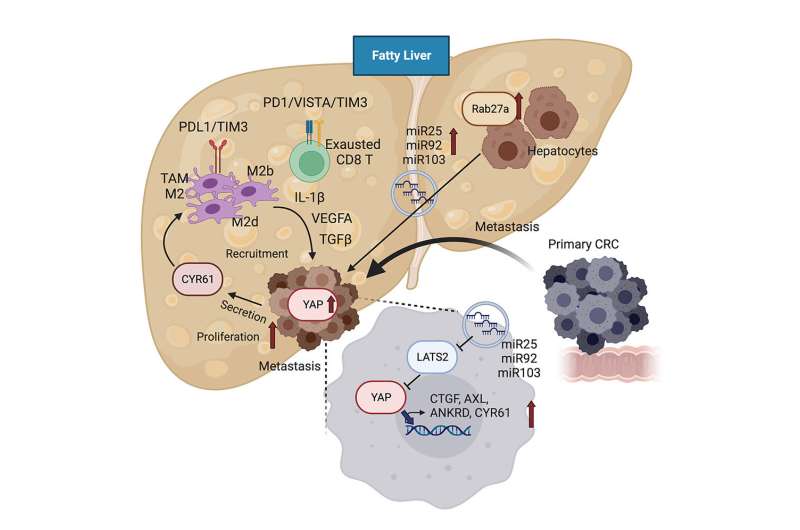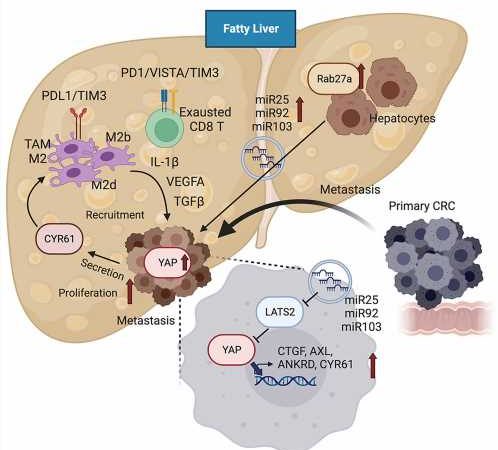
Investigators at Cedars-Sinai Cancer found that fatty liver, a condition closely associated with obesity, promotes the spread of colorectal cancer to the liver. Their study, published today in the journal Cell Metabolism, details the process at the cellular level and could change the way doctors manage the disease in some patients.
“Currently 25% to 30% of U.S. adults are obese, making it likely that they also have fatty liver,” said Ekihiro Seki, MD, Ph.D., professor of Medicine and Biomedical Sciences at Cedars-Sinai and senior author of the study. “Our study found that fatty liver cells secrete sacs of proteins and genetic material that promote the spread of colorectal cancer to the liver, suggesting doctors should manage colorectal cancer patients with fatty liver differently.”
Seki noted that the study examined a mild form of fatty liver—one that clinicians might not be aware of or on the lookout for. He further emphasized that this condition is likely underdiagnosed.
“Our study showed that even mild fatty liver increased the risk of cancer spread,” Seki said. “Thus, we are urging doctors to really pay attention to colorectal cancer patients who might have fatty liver. Among our patient samples, we noted that more than 40% of patients had fatty liver, but doctors often do not order the specialized MRI required to detect it, meaning many cases are missed.”
Ultimately, 70% of patients with colorectal cancer will develop liver metastasis, which is the major cause of death for these patients, according to Seki. He and fellow investigators sought to discover why some patients develop aggressive metastasis while others do not, and to determine why only some patients respond well to therapy.
“Our hypothesis was that fatty liver does something to cause these differences,” Seki said.
Seki and his team examined laboratory mice with colorectal cancer liver metastasis, some of which had been fed a high-fat diet that caused them to develop fatty liver. They noted that liver cells in the mice with fatty liver produced greater amounts of extracellular vesicles—particles that are released from cells and carry proteins and genetic material from the parent cell.
“The extracellular vesicles produced by fatty liver cells contain three types of microRNA that stimulate cancer proliferation, migration and invasion,” Seki said. “The cancer cells take in these extracellular vesicles and these microRNA react with another protein called yes-associated protein to promote tumor growth. So the primary cancer in fatty liver mice becomes more aggressive and more metastatic.”
These yes-associated proteins also suppress the immune system in the environment immediately surrounding tumors, which Seki theorized could make them resistant to immunotherapy, a common cancer-fighting treatment.
The investigators found the same types of conditions when they compared tissue samples from human patients with and without fatty liver who also had colorectal cancer liver metastasis.
Seki said further studies are needed to examine whether fatty liver in lean patients, which is common in Asian populations, has the same effect on cancer spread. Additional research could also help determine whether metastatic colorectal cancer is resistant to immunotherapy in patients with fatty liver, and how that resistance might be reversed.
“This study provides new insight into the mechanisms behind the fatty liver’s promotion of colorectal cancer metastasis, and into distinct tumor microenvironments in patients with fatty liver that may contribute to weak response to anti-cancer therapies,” said Dan Theodorescu, MD, Ph.D., director of Cedars-Sinai Cancer and the PHASE ONE Distinguished Chair.
“We have ongoing efforts aimed at populations at high risk of fatty liver disease, and this study suggests we need to redouble our efforts especially in those who have colorectal cancer.”
More information:
Ekihiro Seki, Extracellular Vesicles in Fatty Liver Promote a Metastatic Tumor Microenvironment, Cell Metabolism (2023). DOI: 10.1016/j.cmet.2023.04.013. www.cell.com/cell-metabolism/f … 1550-4131(23)00140-7
Journal information:
Cell Metabolism
Source: Read Full Article
